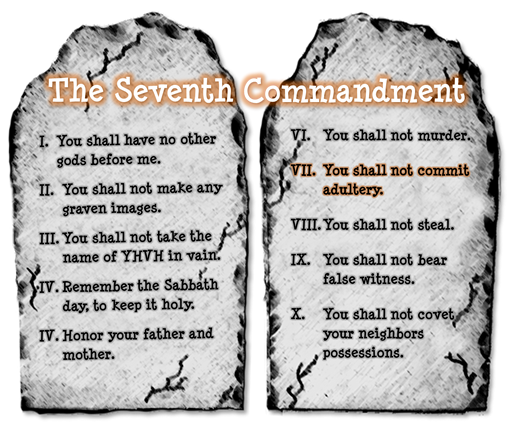
The Seventh Commandment
The seventh commandment says, "Thou
shalt not commit adultery" (Ex. 20:13). The Hebrew
word for adultery is nâ'aph which means,
"to commit
adultery, usually of man , always with wife of another"
(Brown-Driver-Briggs H5003). Adultery is when a man, or a
woman, break their vows with their spouse. The seventh
commandment is immensely related to the fifth commandment.
The fifth commandment is to "Honour thy father and thy
mother: that thy days may be long upon the land which the LORD
thy God giveth thee" (Ex. 20:12). The fifth
commandment seeks to protect the family unit so that the nation
will live long in the land. The seventh commandment does
the same. If there is anything that destroys the family it
is the act of adultery. The seventh commandment, along
with the fifth commandment, keep the fabric of a nation intact
by supporting the family.
, always with wife of another"
(Brown-Driver-Briggs H5003). Adultery is when a man, or a
woman, break their vows with their spouse. The seventh
commandment is immensely related to the fifth commandment.
The fifth commandment is to "Honour thy father and thy
mother: that thy days may be long upon the land which the LORD
thy God giveth thee" (Ex. 20:12). The fifth
commandment seeks to protect the family unit so that the nation
will live long in the land. The seventh commandment does
the same. If there is anything that destroys the family it
is the act of adultery. The seventh commandment, along
with the fifth commandment, keep the fabric of a nation intact
by supporting the family.
Property Rights:
The last five commandments establish all property rights. This is true of the seventh commandment as well. Without property rights there is no point to having law and order. Without property rights there is no law and order. Here is the legal definition to property. "Property is the highest right a man can have to anything: being used for that right which one has to lands or tenements, goods or chattels, which no way depends on another man's courtesy" (Black's Law Dictionary, First Edition, pg. 953). Property is the "highest right a man can have to anything." This right is basis of what law seeks to defend. Property is "The right and interest which a man has in lands and chattels to the exclusion of otherss. It is the right to enjoy and to dispose of certain things in the most absolute manner as he pleases, provided he makes no use of them prohibited by law". It is the right to enjoy and to dispose of certain things in the most absolute manner as he pleases, provided he makes no use of them prohibited by law" (John Bouvier, A Law Dictionary, 1856, "Property"). When someone has a property right in anything they can exclude others from that thing. There is a distinction that must be made. Property is a right, not a thing. The thing is simply the subject of property. "All things are not the subject of property, the sea, the air, and the like, cannot be appropriated" (John Bouvier, A Law Dictionary, 1856, "Property"). Property is a right, it is not a thing. We look at this differently today. We speak as if property is the thing we are speaking about. Nothing in heaven or earth is ours. "Behold, the heaven and the heaven of heavens is YHVH thy Gods, the earth also, with all that therein is" (Deut. 10:14). Everything belongs to YHVH. We can only have a right to use what is YHVHs. So how does this fit with the seventh commandment?
Marriage:
Man has a property right in their wife. Woman also has a property right in their husband. "And Adam said, This is now bone of my bones, and flesh of my flesh: she shall be called Woman, because she was taken out of Man. Therefore shall a man leave his father and his mother, and shall cleave unto his wife: and they shall be one flesh. And they were both naked, the man and his wife, and were not ashamed" (Gen. 2:23-25). When a man and a woman join in marriage they become the same person. They both gain a property right in the other. The Apostle Paul said, "Let the husband render unto the wife due benevolence: and likewise also the wife unto the husband. The wife hath not power of her own body, but the husband: and likewise also the husband hath not power of his own body, but the wife" (1 Cor. 7:3-4). This is a property right. The husband has a property right to his wife's body and the wife has a property right to her husband's body. The quote above says, "The right and(John Bouvier, A Law Dictionary, 1856, "Property") interest which a man has . . . to the exclusion of others" (John Bouvier, A Law Dictionary, 1856, "Property"). When a man and wife marry they give their body as property to the other. Adultery is the taking of that property right away from a husband or wife. Here is a video to help further understand the seventh commandment.
Conclusion:
The purpose of the seventh commandment is the same as the fifth commandment. Together they are designed to preserve the family. The statutes that fall under this commandment all relate to marriage a divorce. The titles of law that fit under the seventh commandment are:
|
By Steve Siefken
Study to shew thyself approved unto God, a workman that needeth
not to be ashamed, rightly dividing the word of truth.
2 Timothy 2:15 KJV